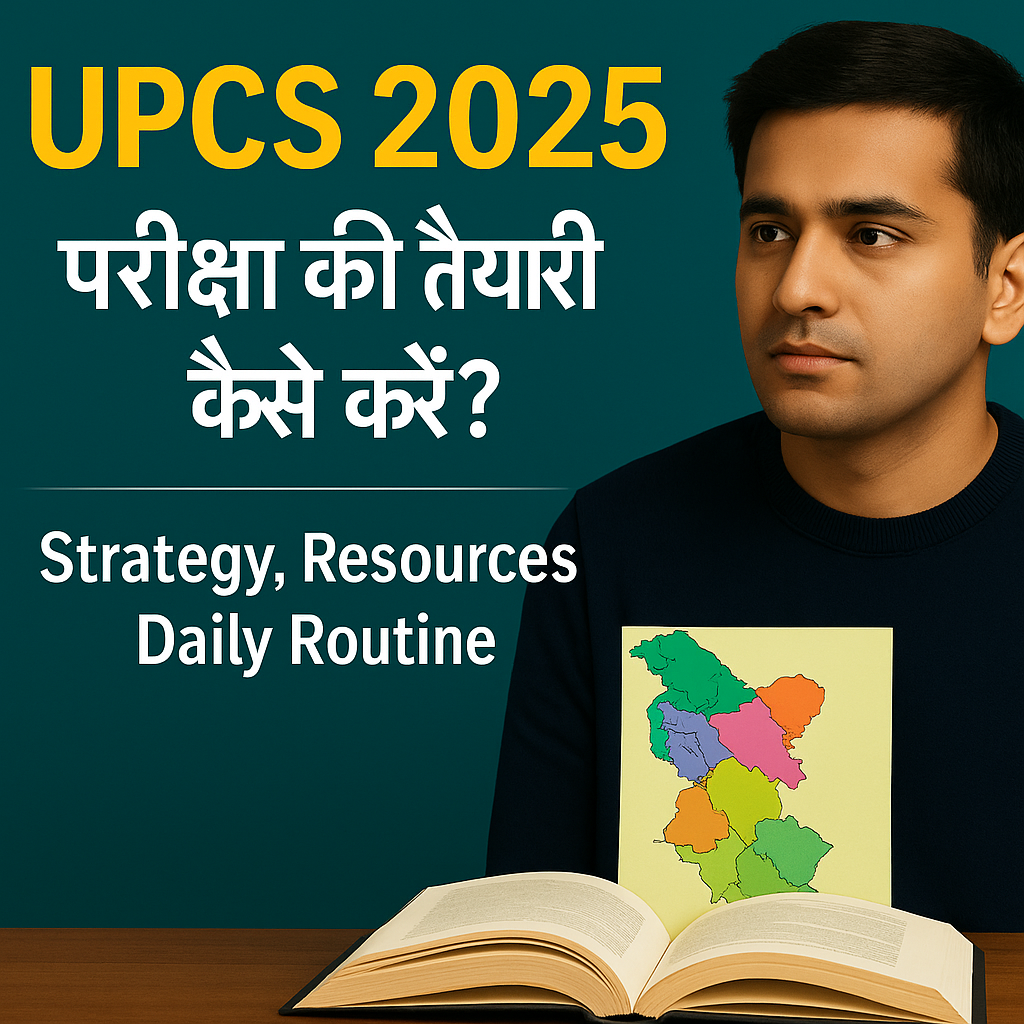The Uttar Pradesh Public Service Commission (UPPSC) conducts the UPPCS Exam to recruit Group A and B officers for various departments in the state government. It is one of the most prestigious and competitive state civil service exams in India, second only to the UPSC Civil Services Exam.
If you dream of serving the state of Uttar Pradesh as a Deputy Collector, DSP, BDO, or in other administrative capacities, this article will guide you through everything — from eligibility criteria to preparation strategy, syllabus, exam pattern, and books to read.
📌 What is UPPCS Exam?
UPPCS (Uttar Pradesh Provincial Civil Services) is conducted annually by UPPSC (Uttar Pradesh Public Service Commission). It recruits candidates for various administrative roles such as:
- Deputy Collector
- Deputy Superintendent of Police (DSP)
- Block Development Officer (BDO)
- Assistant Regional Transport Officer (ARTO)
- Tehsildar
- Naib Tehsildar
- Commercial Tax Officer
- District Commandant Home Guards
- Excise Inspector, and many more
📅 UPPCS 2025 Important Dates (Tentative)
| Event | Date |
|---|---|
| Notification Release | January 2025 |
| Application Start Date | January 2025 |
| Application Last Date | February 2025 |
| Prelims Exam | May/June 2025 |
| Mains Exam | October 2025 |
| Interview | December 2025 |
📋 UPPCS Eligibility Criteria
🔸 Educational Qualification
A bachelor’s degree from a recognized university is required. Final-year students can also apply if they meet the eligibility before the mains exam.
🔸 Age Limit (As of 1st July 2025)
- Minimum Age: 21 years
- Maximum Age: 40 years
- Age relaxation available for SC/ST/OBC/Ex-Servicemen/Women candidates as per UP Govt rules.
🧠 UPPCS Exam Pattern
The exam is conducted in three stages:
1️⃣ Preliminary Exam
It is a screening test and comprises two papers:
| Paper | Subject | Marks | Duration |
|---|---|---|---|
| Paper I | General Studies I | 150 | 2 hours |
| Paper II | General Studies II (CSAT) | 100 | 2 hours |
Note: CSAT is qualifying in nature (33% marks needed).
2️⃣ Mains Exam
It is descriptive and plays a crucial role in the final selection.
| Paper | Subject | Marks |
|---|---|---|
| Paper I | General Hindi | 150 |
| Paper II | Essay | 150 |
| Paper III | General Studies I | 200 |
| Paper IV | General Studies II | 200 |
| Paper V | General Studies III | 200 |
| Paper VI | General Studies IV | 200 |
| Paper VII | Optional Paper I | 200 |
| Paper VIII | Optional Paper II | 200 |
Total = 1500 Marks
3️⃣ Interview (Personality Test)
- Marks: 100
- Conducted for candidates who clear the mains exam.
- Assesses your personality, general awareness, and suitability for a civil services career.
🗺️ UPPCS Syllabus Overview
✅ Prelims Syllabus
- History and Culture of India and UP
- Indian National Movement
- Geography of India and UP
- Indian Polity and Governance
- Economic and Social Development
- Current Affairs (National & International)
- Environmental Ecology
- Logical Reasoning, Interpersonal Skills
- Basic Numeracy, Data Interpretation
✅ Mains Syllabus
Each GS paper focuses on a different set of topics. For instance:
- GS I: History, Indian Culture, Geography
- GS II: Polity, Constitution, Governance, Social Justice
- GS III: Economy, Agriculture, Science, Environment
- GS IV: Ethics, Integrity, Aptitude
📚 Best Books for UPPCS Preparation
| Subject | Recommended Book |
|---|---|
| History | Spectrum + NCERT |
| Geography | NCERT + GC Leong |
| Polity | M. Laxmikanth |
| Economy | Ramesh Singh |
| Environment | Shankar IAS |
| Current Affairs | Yojana + The Hindu + Vision IAS Monthly |
🧩 Optional Subjects
UPPSC offers a list of 29 optional subjects. Some popular ones include:
- Sociology
- Geography
- History
- Political Science
- Public Administration
- Hindi Literature
Choose your optional based on:
- Interest
- Background
- Availability of study material
- Past year trends
🧘♀️ Daily Routine for UPPCS Aspirants
A disciplined daily routine is key. Here’s a sample plan:
| Time | Activity |
|---|---|
| 5:30 AM | Wake up, freshen up |
| 6:00–7:00 AM | Newspaper + Current Affairs |
| 7:00–9:00 AM | GS Subject 1 |
| 9:00–10:00 AM | Break + Breakfast |
| 10:00–12:00 PM | GS Subject 2 |
| 12:00–1:00 PM | Revision of previous day |
| 1:00–2:00 PM | Lunch + Rest |
| 2:00–4:00 PM | Optional Subject |
| 4:00–6:00 PM | MCQs Practice |
| 6:00–7:00 PM | Walk/Rest |
| 7:00–9:00 PM | Ethics/Essay Practice |
| 9:00–10:00 PM | Light reading/Yojana |
| 10:00 PM | Sleep |
🔑 Success Mantra & Strategy
- Understand the Syllabus: Read it 10 times. Follow it like a GPS.
- Limit Resources: One book, multiple revisions. Don’t hoard material.
- Make Notes: For quick revision and answer writing.
- Answer Writing Practice: Start after completing 60% syllabus.
- Mock Tests: Crucial for prelims and mains.
- Current Affairs: Must cover state-specific news too.
- Optional Mastery: Choose wisely and revise regularly.
👨🏫 Coaching vs Self-Study
Both options work. Coaching helps with discipline and mentorship. But many toppers have cleared UPPCS with self-study and online resources like YouTube, PDF notes, and test series.
🧾 Final Words
UPPCS is not just an exam; it is a journey towards becoming a servant leader for the largest state of India. With right guidance, consistent efforts, and smart strategy, you can achieve your goal and bring real change to society.
Start today. Stay focused. Stay positive. The chair of a PCS officer awaits your nameplate.

